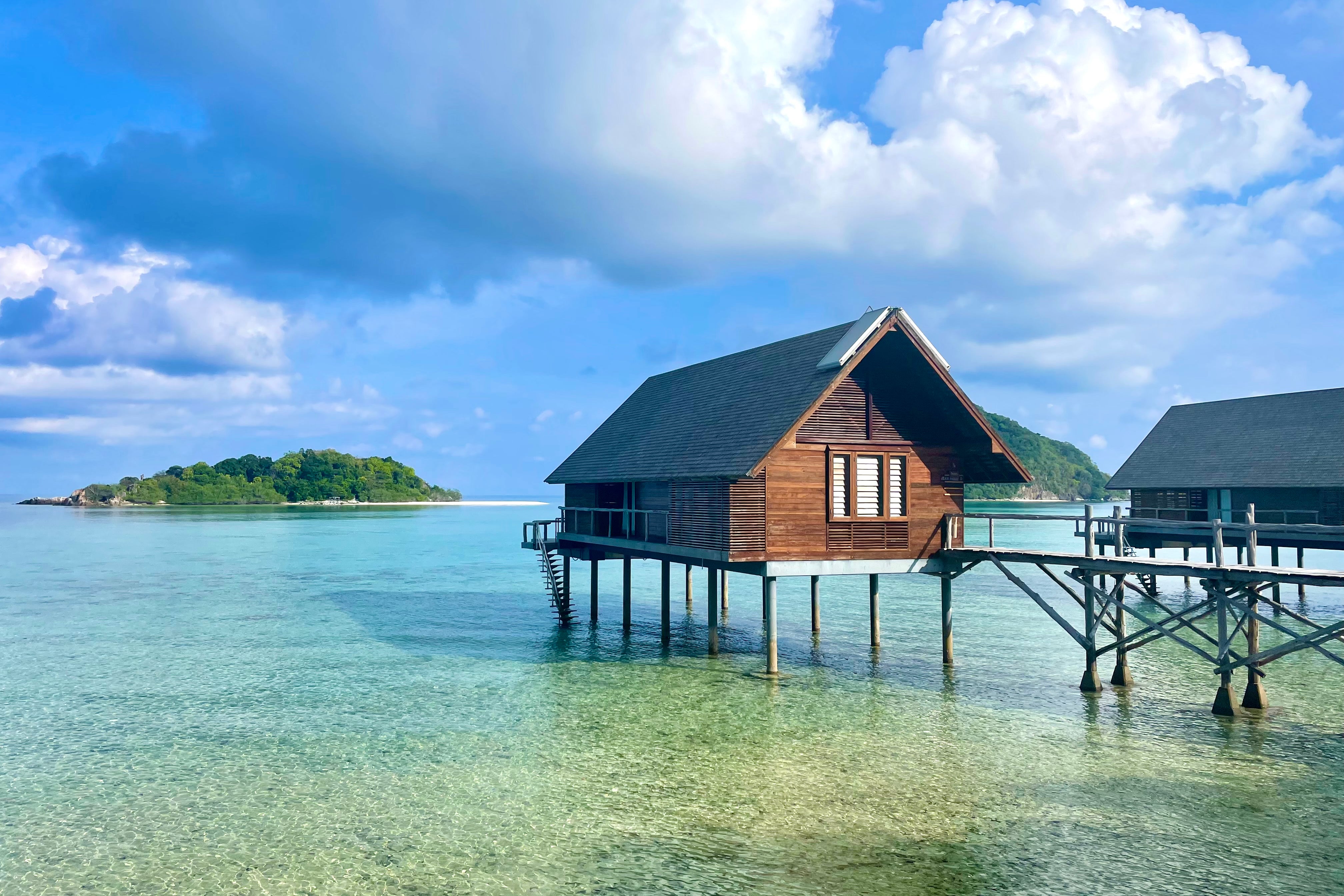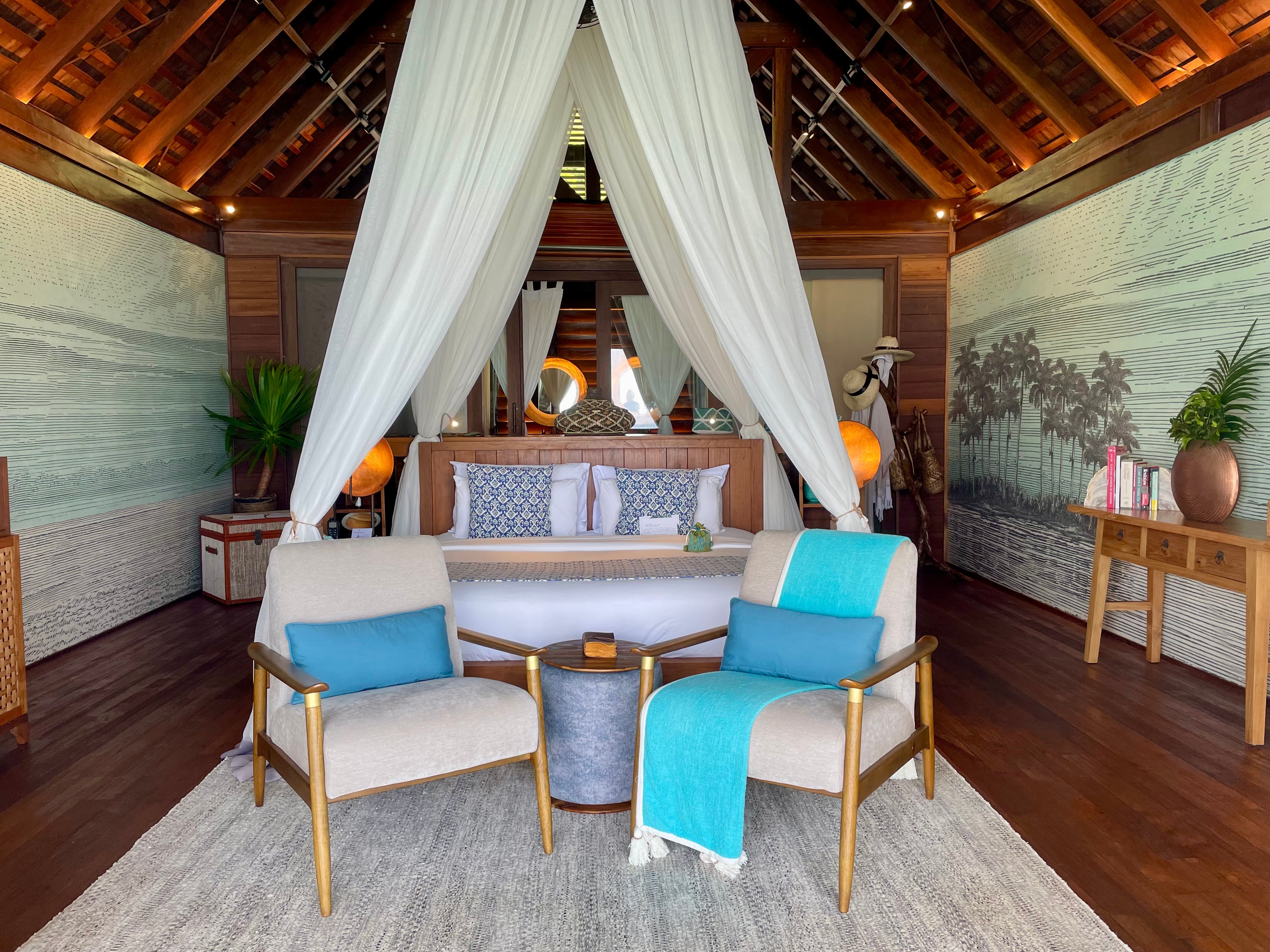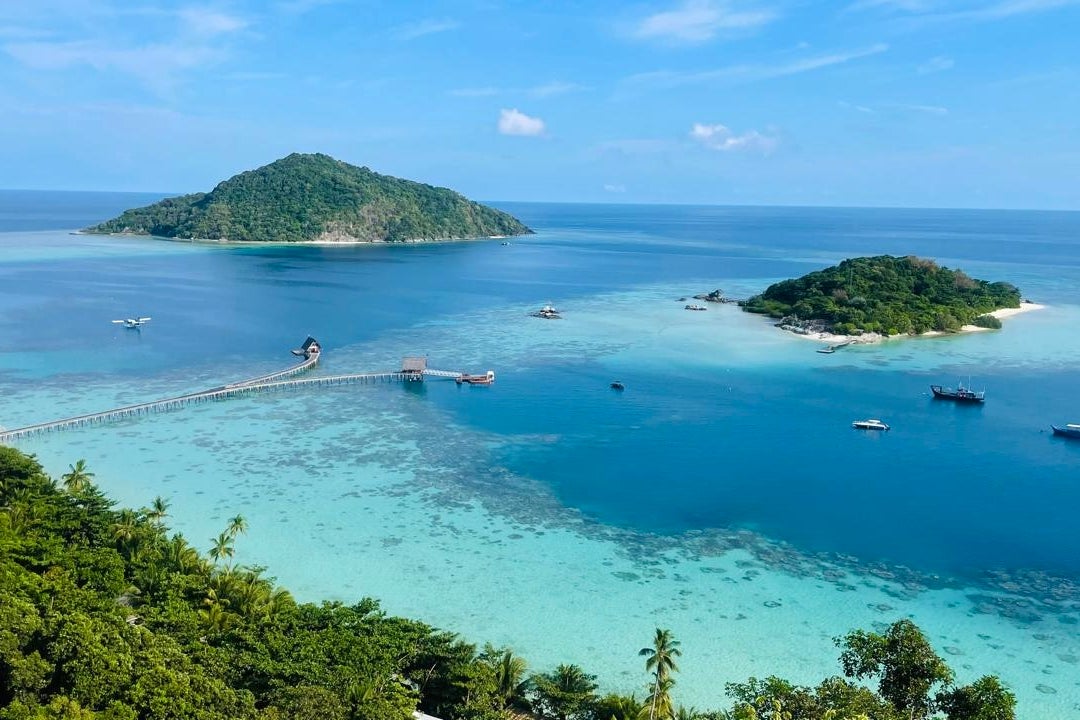
I don’t think it’s possible to snorkel over the coral reefs at Bawah Reserve without your heart skipping a beat. Shoals of butterfly fish glide past. Clownfish peep out of the coral. Electric blue and yellow demoiselle fish no larger than your thumb nail nibble at the reefs. Huge silver tuna follow each other single file. Green turtles dip and dive. Swim at the right time and you might even catch black tipped reef sharks snooping around for breakfast. It’s a secret underwater world that makes you catch your breath.
Perhaps the most striking place to snorkel on this remote getaway in Indonesia’s Anambas islands is around the charmingly wonky pier, where guests arriving via seaplane get their first glance of the Bawah, and from which they may then head off on diving explorations or sunset boat rides. It’s wonky not due to misdesign (everything on this island is planned with exquisite detail) but because it was painstakingly built by specialist divers to ensure that the surrounding coral reefs were not disturbed. You’ll note that everything on this reserve has been constructed with the ethos that guests should be living within nature and not displacing it – and nowhere more so than the reefs.

Read more: The peaceful islands to visit away from crowded holiday hotspots
All the typical words you’d use to describe an island resort don’t quite cut it for Bawah; paradise, idyllic and blissful somehow seem to fall short. The five-star resorts with Michelin restaurants, private beaches and butler service I’ve stayed at can’t really compare to the laidback natural beauty of the Bawah reserve.
Situated in the western part of the South China Sea, the Anambas archipelago – which consists of more than 250 islands – is actually closer to Malaysia than the best known Indonesian islands of Sumatra, Bali and Borneo. They are remote and largely untouched by the mass tourism that afflicts some of the other islands. Bawah itself is reached by a private seaplane from Batam, which is roughly a 30-minute ferry ride from Singapore.
Villas and suites are reached along a wooden walkway (you may see monitor lizards darting beneath as you make your way to your room) while the spa, restaurants, and tennis courts are hidden in the trees, nestled in beach coves or perched on clifftops. All buildings have been constructed entirely by hand without the use of heavy machinery, and local employment is a priority – from the construction of the infrastructure to staffing of the resort.

Read more: How a remote Indonesian island is using horses for wellness
The island is all-inclusive, which means you can eat as much as you like, but food waste is discouraged. Food portions are pleasantly small, and guests are welcomed to ask for more if required.
But beyond guest experience is an unwavering commitment to nature that makes Bawah stand out. Snorkelling around the pier, you may spot some slightly unusual-looking reefs – shaped like giant spiders, flat hexagons or even domes with glass bottles sticking out. These are artificial reefs that the marine conservationists from Bawah Reserve have placed in the ocean and gently transplanted coral onto as part of a restoration plan. The reefs previously suffered as a result of unregulated fishing and human activity, but a programme was put in place to remove discarded “ghost” fishing nets and plastic, and fishing is now banned in the immediate area. It is thought that the artificial reefs have rehabilitated an area of over 700 square metres.
Other conservation initiatives include a sea turtle semi-natural nest and hatchery to protect the young turtles from natural predators such as monitor lizards and allow the population to grow, as well as a push for clean energy. Gaze out over the ocean and you’ll spot floating solar panels that were installed in 2022 – these 18 panels now provide the majority of Bawah’s electricity, saving around 468 litres of diesel per day. Even prior to their installation, all hot water to the rooms was supplied by roof solar panels.

Read more: This paradise island is a quieter, cheaper alternative to Bali
Granted, paradise comes at a price. A visit to Bawah isn’t kind to the wallet – which raises the question if a truly sustainable getaway can be affordable. Plus, the carbon footprint of the long-haul flight and sea plane that it takes to reach Bawah from the UK is also not entirely lost on me.
But on the island, staff will tell you that “Bawah changes you”, which truly seems to be the case. You may be in remote islands, but you’re completely connected to the land – and that in itself is a remarkable experience.
Annabel travelled to Bawah Reserve as a guest of Scott Dunn.
Scott Dunn offers seven nights at Bawah Reserve from £13,850 based on a couple sharing on a full board basis and includes return flights from the UK. For more information, visit the Scott Dunn website or call 020 3393 0884.
The best riads in Marrakech to stay in for winter sun
I have found the 10 best hotels in Singapore for your next holiday
I have found the best cheap hotels in Bath
The best riads in Marrakech to stay in for winter sun
The best hotels in Hanoi, from five-star luxury to boutique stays near the Old Town







